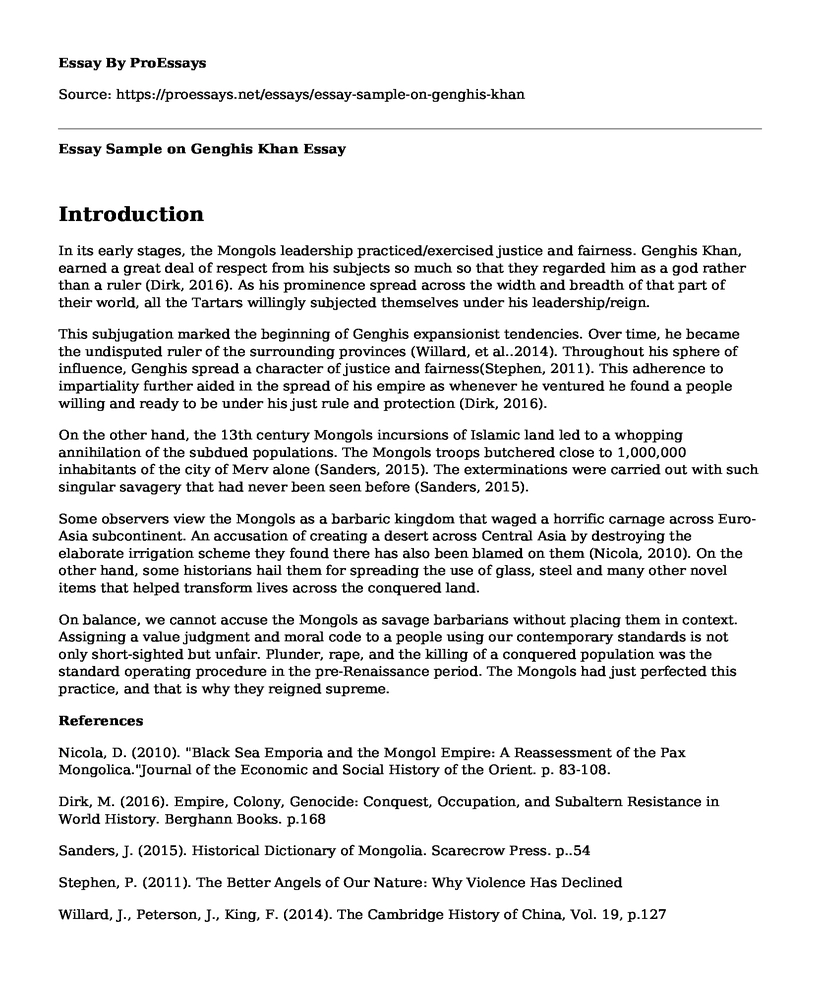Introduction
In its early stages, the Mongols leadership practiced/exercised justice and fairness. Genghis Khan, earned a great deal of respect from his subjects so much so that they regarded him as a god rather than a ruler (Dirk, 2016). As his prominence spread across the width and breadth of that part of their world, all the Tartars willingly subjected themselves under his leadership/reign.
This subjugation marked the beginning of Genghis expansionist tendencies. Over time, he became the undisputed ruler of the surrounding provinces (Willard, et al..2014). Throughout his sphere of influence, Genghis spread a character of justice and fairness(Stephen, 2011). This adherence to impartiality further aided in the spread of his empire as whenever he ventured he found a people willing and ready to be under his just rule and protection (Dirk, 2016).
On the other hand, the 13th century Mongols incursions of Islamic land led to a whopping annihilation of the subdued populations. The Mongols troops butchered close to 1,000,000 inhabitants of the city of Merv alone (Sanders, 2015). The exterminations were carried out with such singular savagery that had never been seen before (Sanders, 2015).
Some observers view the Mongols as a barbaric kingdom that waged a horrific carnage across Euro- Asia subcontinent. An accusation of creating a desert across Central Asia by destroying the elaborate irrigation scheme they found there has also been blamed on them (Nicola, 2010). On the other hand, some historians hail them for spreading the use of glass, steel and many other novel items that helped transform lives across the conquered land.
On balance, we cannot accuse the Mongols as savage barbarians without placing them in context. Assigning a value judgment and moral code to a people using our contemporary standards is not only short-sighted but unfair. Plunder, rape, and the killing of a conquered population was the standard operating procedure in the pre-Renaissance period. The Mongols had just perfected this practice, and that is why they reigned supreme.
References
Nicola, D. (2010). "Black Sea Emporia and the Mongol Empire: A Reassessment of the Pax Mongolica."Journal of the Economic and Social History of the Orient. p. 83-108.
Dirk, M. (2016). Empire, Colony, Genocide: Conquest, Occupation, and Subaltern Resistance in World History. Berghann Books. p.168
Sanders, J. (2015). Historical Dictionary of Mongolia. Scarecrow Press. p..54
Stephen, P. (2011). The Better Angels of Our Nature: Why Violence Has Declined
Willard, J., Peterson, J., King, F. (2014). The Cambridge History of China, Vol. 19, p.127
Cite this page
Essay Sample on Genghis Khan. (2022, Dec 02). Retrieved from https://proessays.net/essays/essay-sample-on-genghis-khan
If you are the original author of this essay and no longer wish to have it published on the ProEssays website, please click below to request its removal:
- Essay Sample on The Wrath of Achilles and its Role in the Iliad
- Essay Sample on Universal Ideas and Emotions Through Specific Contexts
- Essay Example on Frederic Chopin: The Prodigy Pianist and Composer
- Research Paper on The El Salvadoran Civil War: Historical Context and Events
- Paper Example on Beethoven's Symphonies: Exploring Art & Ideas
- Essay Example on Reconstruction: Black Codes & the Re-Shaping of the South
- Essay Example on Night: Elie Wiesel's Story of Holocaust Survival and Identity







